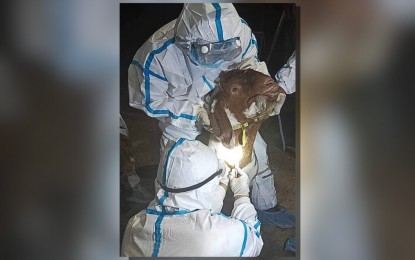
BLOOD SAMPLE. Department of Agriculture-Bureau of Animal Industry personnel get a blood sample from an imported goat at the agency’s quarantine facility in Pampanga in this undated photo. The agency said Friday (June 21, 2024) 94 goats imported from the United States were condemned after 19 samples returned positive results for Q fever. (Photo courtesy of Department of Agriculture)
MANILA – The Department of Agriculture-Bureau of Animal Industry (DA-BAI) confirmed Friday the country’s first cases of Q fever in imported goats from the United States.
Q fever is a zoonotic disease caused by the Coxiella burnetii bacteria, which is transmissible to humans through contact with infected animals or their excreta, or body and birthing fluids.
In a press conference, BAI National Veterinary Quarantine Services Division officer-in-charge Dr. Christian Daquigan said 19 samples from the imported goats tested positive for Q fever after a series of tests.
He said all infected goats, which were bought for the dispersal program for farmers, were already “depopulated in secluded farms” in Pampanga and Marinduque to ensure the safety of animals and humans.
Even the goats that have not been tested were depopulated to eliminate any possible source of Q fever infection, he said.
Some 94 imported goats were condemned.
“BAI is taking decisive measures to contain the disease and prevent further spread. Infected goats have been depopulated, and tracing of potentially infected animals is ongoing to prevent the spread of Q fever,” Daquigan said.
He said no major outbreak was recorded, and the agency is conducting extensive surveillance in the affected areas.
“Hindi po natin siya masasabing major outbreak kasi talagang iyong mga animals ay secluded lang doon sa iisang area. At kumbaga, napigilan natin iyong pagkalat, hindi siya naikalat talaga (We cannot say that it’s a major outbreak because the animals are secluded in a single area. We have prevented its spread, so to speak, there’s no further transmission),” he said.
Meanwhile, DA Assistant Secretary Arnel de Mesa said a fact-finding team has already been formed to investigate the matter.
“Maglalabas ang ating kalihim (Agriculture Secretary Francisco Tiu Laurel Jr.) ng temporary importation ban ng kambing mula sa US hanggang sa ma-trace natin talaga (Our secretary will issue a temporary importation ban on goats from the US until we finally trace [its source],” he said.
De Mesa said the imported goats arrived in the Philippines last January 11.
These were brought to the quarantine facility in Pampanga for the mandatory 30-day quarantine, and blood sampling and testing.
The BAI did its initial enzyme-linked immunosorbent assay (ELISA) test after some pregnant goats showed Q fever symptoms, which include abortion. The positive results for Q fever came out February 6.
Some goats, however, were transferred to Marinduque, which underwent a separate series of tests on March 11.
Its first confirmatory test under reverse transcription polymerase chain reaction (RT-PCR) turned out positive on June 19, followed by a similar result for the final confirmatory test on June 20.
De Mesa said the fact-finding team will also investigate why some goats were transferred to Marinduque despite earlier observations in Pampanga.
Local goats safe for consumption
Daquigan, meanwhile, said the meat and milk of local goats are still safe for human consumption.
“Safe pa po, basta make sure po natin lagi na iyong mga kinakain natin is naluto muna nating mabuti. And iyong mga milk, especially ngayon nauuso iyong milk ng goat, kailangan (It’s still safe as long as we properly cook what we’re eating. And the milk, especially now that goat’s milk is a trend, it should be) pasteurized,” he said.
He assured close coordination with the concerned local government units and the Department of Health (DOH) to ensure the welfare of animals and humans, especially the farmers in concerned areas.
The DOH said human to human transmission is rare.
“It is a usually mild zoonotic disease found in animals that can be transmitted to humans, especially among farmers and animal handlers who are in frequent contact with infected animals,” the DOH said in a statement.
The DOH explained that symptoms in humans develop within two to three weeks after exposure and are commonly non-specific and mild. These include fever, fatigue, headache, cough, nausea and vomiting.
It assured the public that Q Fever can be cured by antibiotics available nationwide.
It advises the public to avoid contact with animals suspected to have Q fever.
“If exposure is suspected, please consult with the nearest hospital or clinic,” it said. (With a report from Ma. Teresa Montemayor/PNA)
 The Philippine News Agency is a web-based newswire service of the Philippine government under the supervision of the News and Information Bureau (NIB) of the Presidential Communications Office (PCO).
The Philippine News Agency is a web-based newswire service of the Philippine government under the supervision of the News and Information Bureau (NIB) of the Presidential Communications Office (PCO).